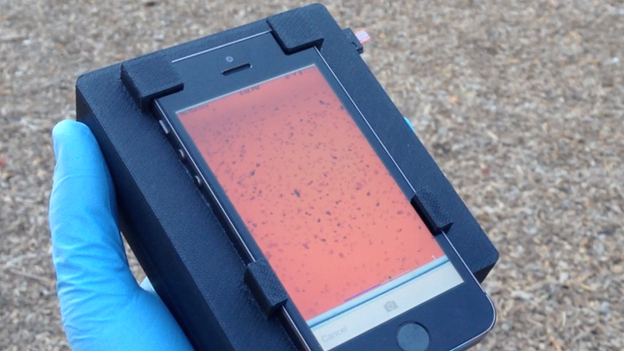Smartphone 'scans' blood for parasites
- Published

A smartphone has been used to automatically detect wriggling parasites in blood samples.
The CellScope system films a drop of blood and an app then automatically analyses any movement in the sample to detect the parasites.
The results, published in Science Translational Medicine, external, showed the device was successful in small trials in Cameroon.
Experts said it marked a fundamental advance in tropical diseases.
Previous efforts to eradicate two parasitic diseases - river blindness and elephantiasis - have been suspended because the treatment can become fatal in some people.
One treatment, the drug ivermectin, is risky in people with high levels of Loa loa worm - the one that can crawl across the surface of the eye - so people need to be screened first.

However, testing is time-consuming and requires laboratory equipment.
Automatic
The team in the most recent research, at the University of California, Berkeley, and the US National Institutes of Health, used a modified smartphone to automate the process.
A pindrop of blood was collected and loaded into a handheld box. The phone on top then kicked in.
"With one touch of the screen, the device moves the sample, captures video and automatically analyses the images," said one of the researchers, Prof Daniel Fletcher.
Rather than attempt to identify the shape of the worm, the software in the phone looks for the movement.
Treat or not?
The software predicts the number of Loa loa parasites in the blood and tells the healthcare workers whether they are suitable for drug treatment.
It means very little training is required, while current screening procedures require someone to be skilled in analysing blood samples by eye.
Early trials in Cameroon of the new approach have been successful and there are now plans to test it on 40,000 people.
Prof Fletcher told the BBC News website: "I'm excited, it offers a new higher-tech approach to dealing with very low-tech problems."
"There are drugs to treat many neglected tropical diseases, these are problems that should be solved, but there is not the technology to identify people who who need the right drugs."
It is hoped the same idea could be adapted to test for other infections such as TB, malaria and soil-transmitted parasitic worms or helminths, which include roundworm.
'Fundamental advance'
Prof Simon Brooker from the London School of Hygiene & Tropical Medicine, commented: "I think it's one of the most fundamental advances in neglected tropical diseases in a long time."
"In the 21st Century we are using 20th Century technology to diagnose these infections, this brings us into the modern world.
"It really is exciting; when you see it you just go 'wow'; hopefully it will transform efforts to eliminate diseases," he added.